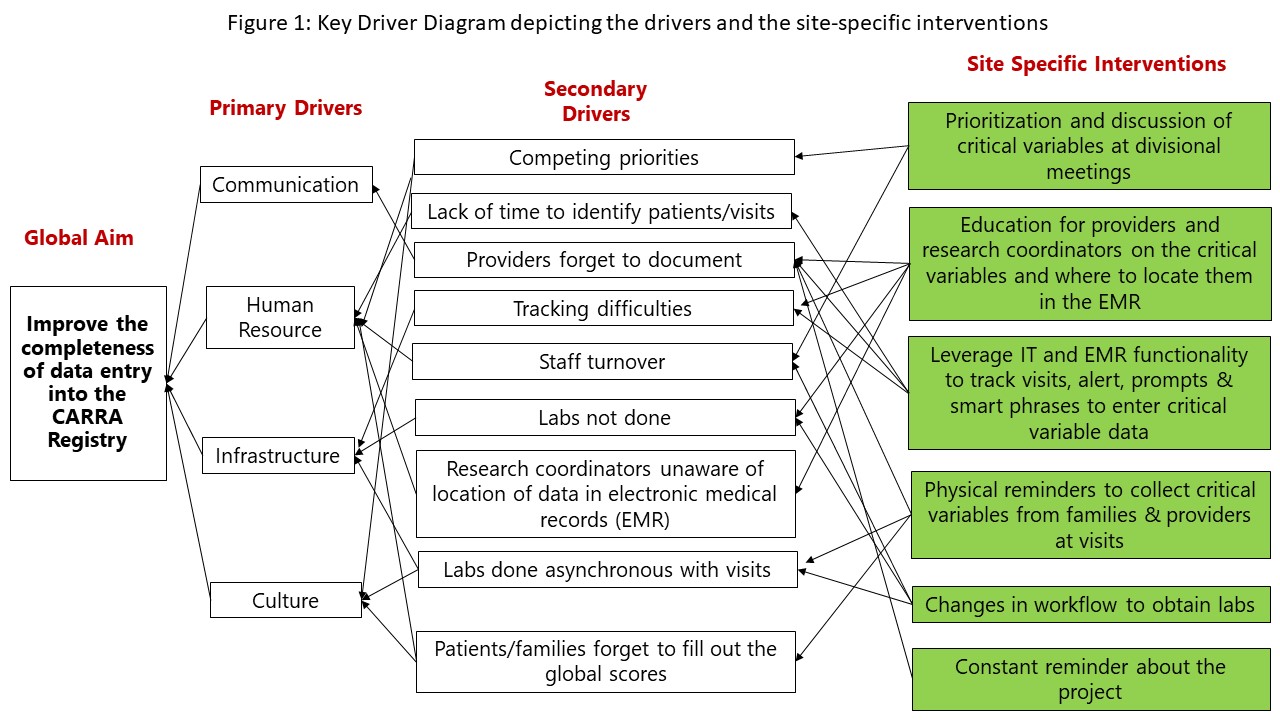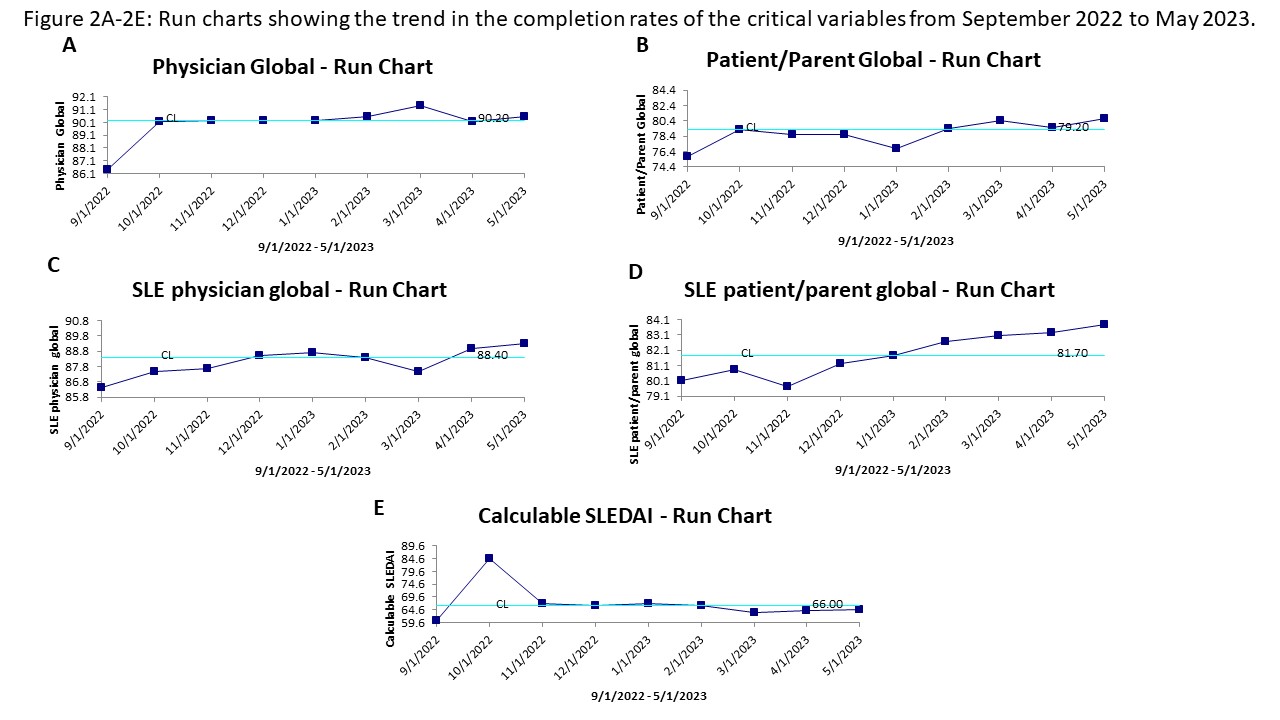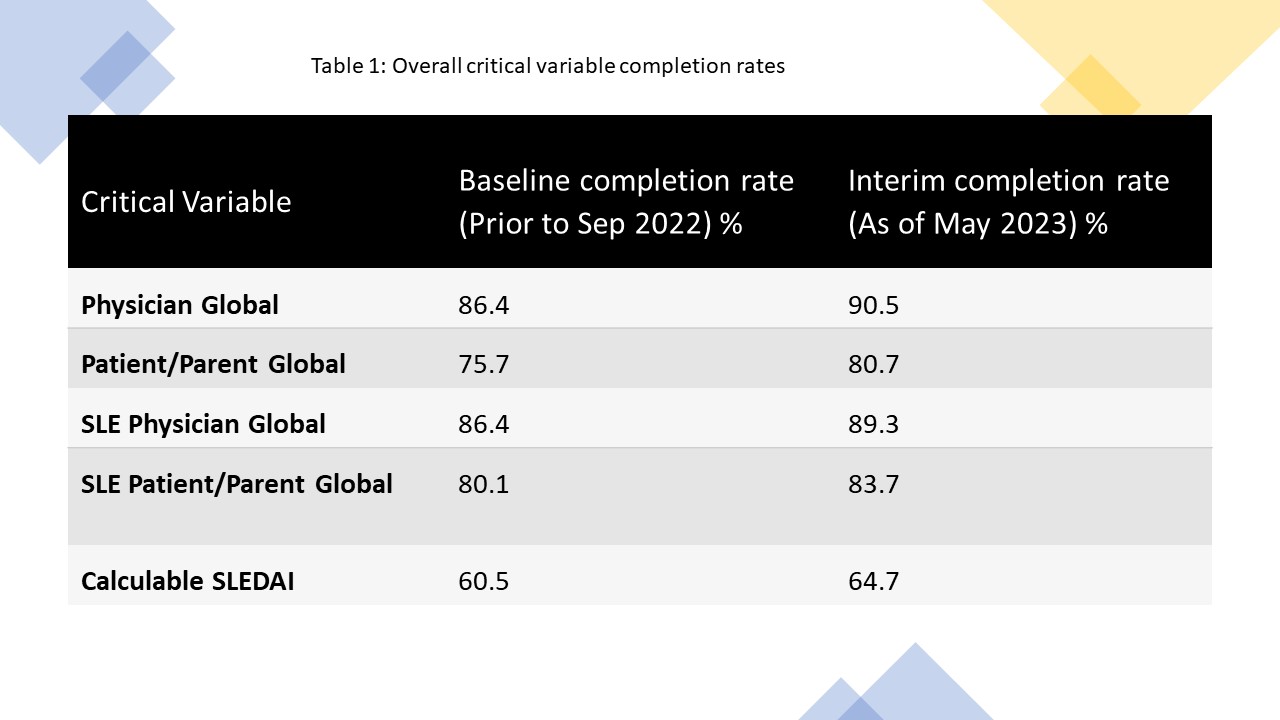Session Information
Date: Monday, November 13, 2023
Title: (1082–1099) Measures & Measurement of Healthcare Quality Poster I
Session Type: Poster Session B
Session Time: 9:00AM-11:00AM
Background/Purpose: Minimizing missing data in research registries is a universal challenge. Enrolling patients into a research registry with poor data quality is wasteful and potentially unethical, as it incurs risks and cost with minimal to no benefit. Data quality is a central focus for the CARRA Registry, and we aimed to improve data completion rates for the Registry’s critical variables using quality improvement (QI) methodology and obtained approval for a large group MOC Part 4 QI project through the American Board of Pediatrics to obtain credit for maintenance of board certification.
Methods: The CARRA Registry Critical Variable MOC 4 Improvement Project is designed to improve data completion rates for critical variables in the CARRA Registry that are required to calculate disease activity outcomes in JIA (Physician Global and Patient/Parent Global scores) and SLE (Calculable SLEDAI Score and SLE Physician & Patient/Parent Global scores). The goal is to close the gap in data completion by 50% over a 12-month period (9/1/2022-8/31/2023).Participation in each project earns 25 MOC part 4 points. Outcome Measures are data completion rates at the Registry level; Process Measures are data completion rates at the site level in addition to completion rates of monthly site engagement surveys where site-specific Plan-Do-Study-Act (PDSA) cycles are documented. At the Registry level, two PDSA cycles were completed thus far: 1) development of site-specific critical variable reports with graphs to illustrate change over time and 2) initiation of monthly office hours/Q&A sessions. Participation is voluntary and each site can choose to participate in one or both projects. The final analysis will include run charts for each sub-project to display improvement over time, and data reflecting overall improvement will be analyzed by chi-square analysis. Data reported herein is an interim analysis as of May 2023.
Results: Out of 71 active CARRA Registry sites, 42 (59%) are participating. Baseline completion rates were calculated from approximately 38,000 visits across participating sites. There have been 5,067 follow up visits entered into the Registry (13% of total) since MOC project initiation. Key drivers and examples of site-specific PDSA interventions are indicated in Fig 1. Interim run charts for each critical variable show a trend towards improvement (Fig 2A-2E). Averaged critical variable completion rates at baseline and May 2023 are noted in Table 1.
Conclusion: Interim analysis reveals a trend towards improvement in completion rates of all targeted critical variables, but the rate of improvement is slower than originally anticipated. This is likely due to the limited cross-section of new visits occurring during the 8-month project period compared to the aggregated visits accumulated from Registry inception to September 2022. As sites accrue additional follow-up visits, and continue to trial site specific interventions, we hope to observe sustained improvement in critical variable completion rates within the CARRA Registry.
To cite this abstract in AMA style:
Srinivasalu H, dennos a, Russell a, Son M, Becker M. Utilizing a Maintenance of Certification (MOC) Part 4 Quality Improvement Project to Improve Data Completeness in the Childhood Arthritis and Rheumatology Research Alliance (CARRA) Registry [abstract]. Arthritis Rheumatol. 2023; 75 (suppl 9). https://acrabstracts.org/abstract/utilizing-a-maintenance-of-certification-moc-part-4-quality-improvement-project-to-improve-data-completeness-in-the-childhood-arthritis-and-rheumatology-research-alliance-carra-registry/. Accessed .« Back to ACR Convergence 2023
ACR Meeting Abstracts - https://acrabstracts.org/abstract/utilizing-a-maintenance-of-certification-moc-part-4-quality-improvement-project-to-improve-data-completeness-in-the-childhood-arthritis-and-rheumatology-research-alliance-carra-registry/



